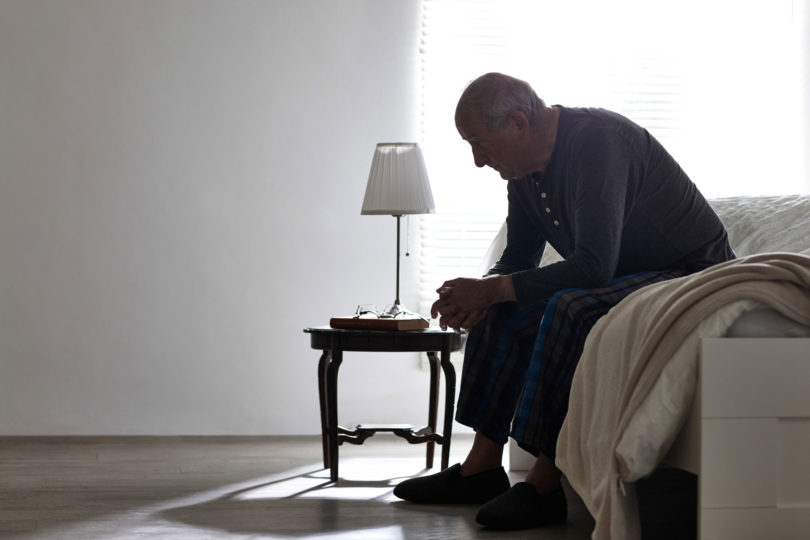One of the greatest mental health challenges Americans are facing right now is depression, and the elderly are no exception.
Depression is like the flu virus. If left untreated, it will undoubtedly get worse, which could lead to self-harm or death. This silent killer is responsible for damaging or ending tens of thousands of American lives each year, and it is reaching epidemic levels both in America and around the world. According to the World Health Organization, there are currently more than 300 million people around the globe struggling with depression.
Sadly, depression can be overlooked by medical professionals. This is especially the case for senior citizens, simply because seniors are sometimes unwilling to seek help. When elderly family members are diagnosed with a chronic condition, they are often aware of their imminent loss of freedom. They may try to hide their symptoms and isolate themselves.
There is a tendency to believe that symptoms of depression are a normal part of aging. However, according to the Centers for Disease Control (CDC), that is not the case. Depression is not solved by putting mind over matter and getting through it.
We need to learn how to listen attentively to elderly people who struggle with mental illness and are suffering in silence. As a community, we need to act and get involved with helping them improve their psychological immune system. Through social media, Dwayne “The Rock” Johnson shared his thoughts about opening up:
“Took me a long time to realize it but the key is to not be afraid to open up. Especially us dudes have a tendency to keep it all in. You’re not alone.”
To explain more on the subject, Dennis Ramos, a psychotherapist from Corpus Christi, Texas, fielded some questions about depression in the elderly.
How do therapists help elderly people with depression?
Ramos: I have learned in working with elderly clients over the past 25 years that depression is quite common. What appears to be causing this to a large degree is grief and loss. Yes, they can have biological factors as well, but that is many times not an issue. As a person ages, they will begin to lose their abilities. This includes the ability to be independent, the ability to work, the ability to go and come as they wish. They often can’t do things they enjoy like running, swimming, playing games, gardening, traveling, making love and many other activities that help a person manage stress. Each one of these losses can, and usually does, lead to feelings of grief. Older people also have more traditional types of losses, like losing a spouse, friend, or relative. Grief is a normal human response to loss.
Many times, the people in an elderly person’s life will not understand this simple fact. Loved ones, friends, and doctors may say to a person, “just accept it, get used to it, get over it, it’s just part of life.” Or they may just try to ignore or minimize what the elderly person is experiencing. What a good therapist understands is that grief is helped by acknowledging that it is valid and real. I will encourage healthy processing of these normal feelings. “You’re not crazy, or weak, or defective, just having normal feelings of loss. It’s OK to feel sad.” With gentle and positive feedback and encouragement, an elderly person can often become less depressed. A therapist can also help to monitor the status and depression of an older person, and make referrals for needed medical care, when indicated.
How can caregivers and family members help?
Ramos: Family members and caregivers can be very helpful to an elderly, depressed person, especially when they understand that grief and loss are normal experiences of aging. They can help to acknowledge and support the reality of the losses that elderly people deal with. So, allowing that person to feel sad, cry, or even get angry can be helpful. Sometimes, we don’t want to see our loved ones sad and grieving, so we may avoid them, ignore them or try to change the subject. But understanding, encouraging and supporting the process of grief can be a very loving and helpful thing to do. If the depression appears to be getting worse, it is good to help that person get some help from a therapist or doctor.
There is an urgency, in every community in America, to learn about and research different ways and strategies to help someone who is struggling with depression. Dealing with and fighting depression requires action. It takes bravery, strength and persistence. Mental illness does not make you less of a person, just as a sports injury does not make you less of an athlete.
Who to call for help
Like the athlete, you will get better and get back in the game if you have professionals monitoring your recovery. Confidential hotlines are there to help. Nonprofit organizations can connect you with a trained therapist. Need to speak to someone right away? Text “CONNECT” to 741741 in the United States to connect with someone from www.crisistextline.org if you are feeling depressed. There is also the National Suicide Prevention Hotline, 1-800-273-8255.
Also, if you know someone who is feeling down, you do not need to be a trained professional to check on them. Use technology to send them a virtual hug via a caring text message, an e-card or even just an old-fashioned phone call telling them you were thinking about them.
We can drastically reduce and eventually eliminate the suicide rate from depression by becoming more aware of red flags associated with this illness, as well as becoming more comfortable with simply acknowledging and discussing the topic of depression.

